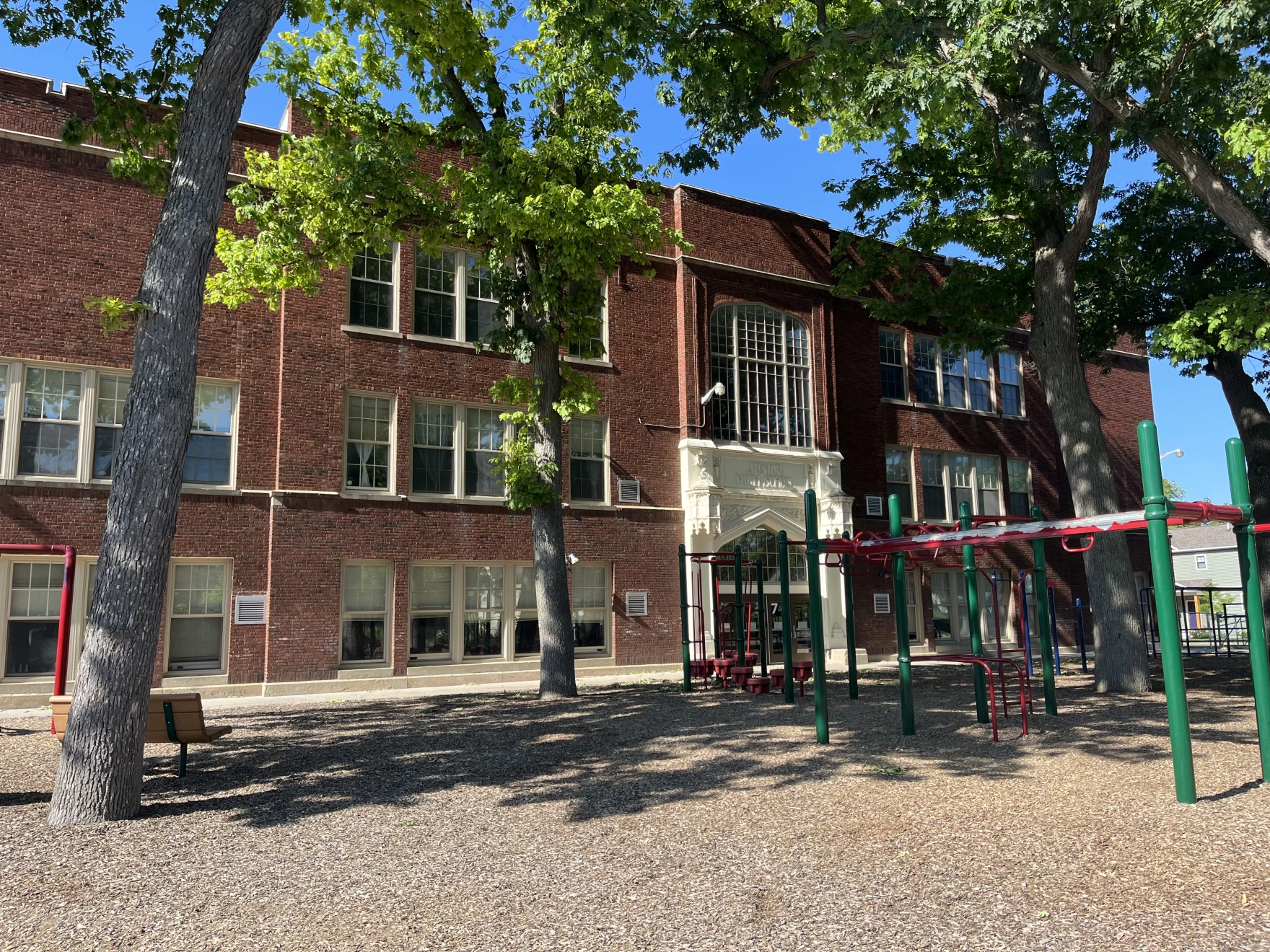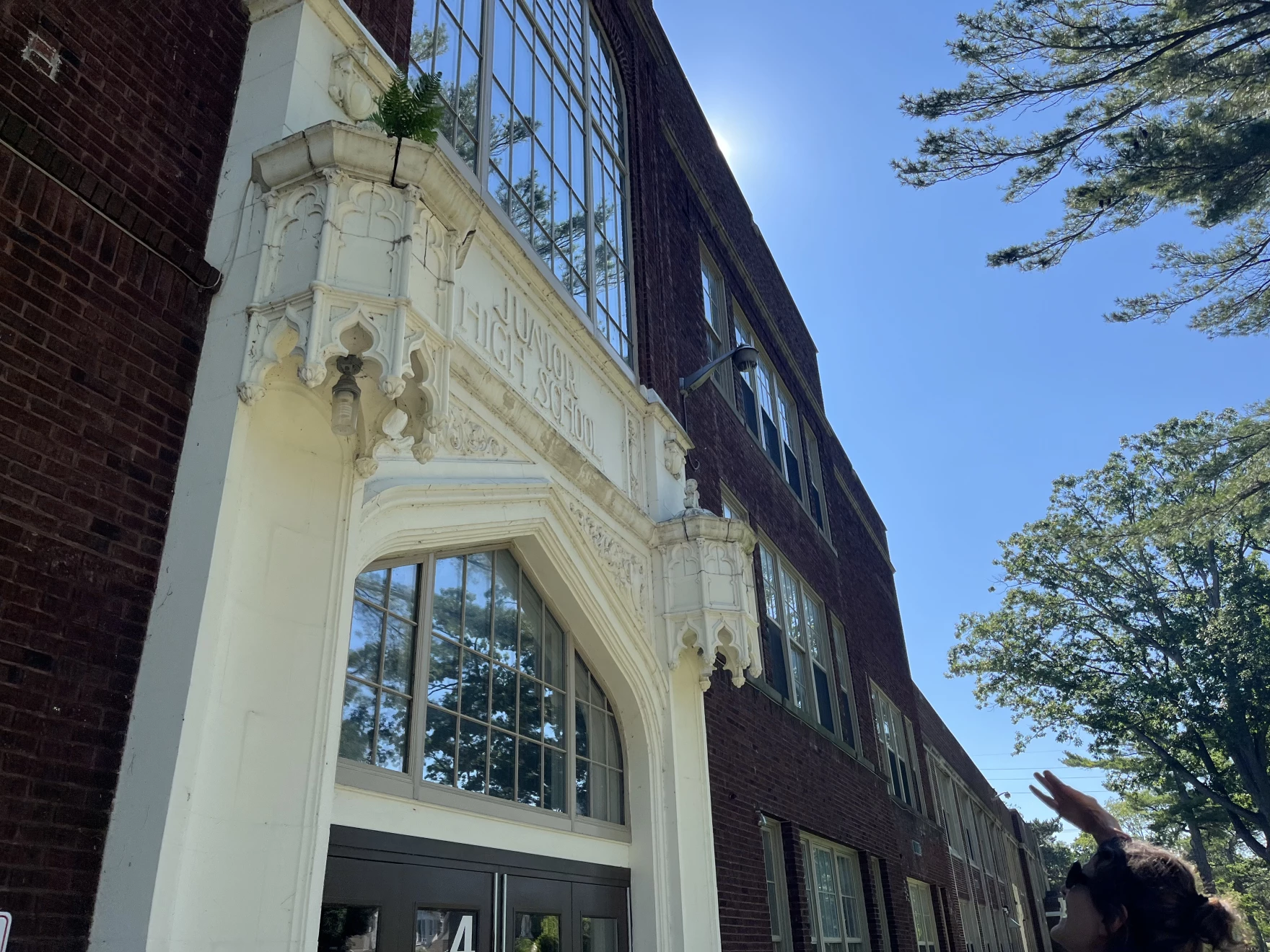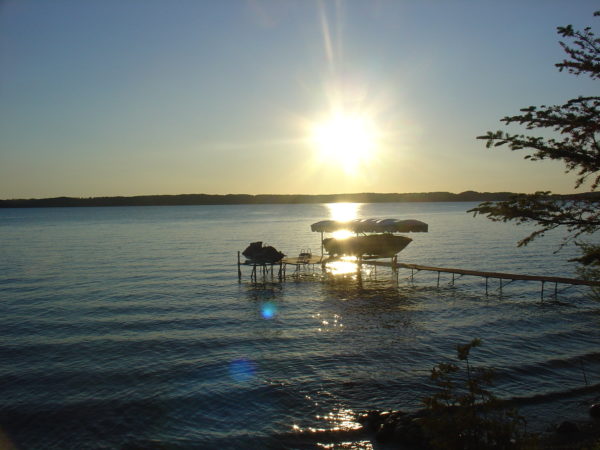
By Izzy Ross, Interlochen Public Radio
This coverage is made possible through a partnership with IPR and Grist, a nonprofit independent media organization dedicated to telling stories of climate solutions and a just future.
Central Grade School, a stately, red-brick building in Traverse City, has a long history. The first school building was constructed there in the 1870s, got expanded, and was severely damaged by a fire in the 1930s before getting rebuilt.
“You can see on that sign it used to be a junior high school,” said Suzannah Tobin, walking around the outside of the school, which is three stories tall at its highest point and stretches for a block on each side. Tobin is an architect who grew up in the area. Until recently, she served on the Historic Districts Commission.
Discussions of maintenance and renovations to Central Grade go back years; officials have said it needs major updates, like reopening a shuttered third floor that hasn’t been used by students since the 1970s due to health concerns. A 2023 facilities assessment recommended replacing the entire electrical distribution system.
Voters in the Traverse City area will choose whether to approve a $180 million bond for the school district in the Aug. 6 primary election. It would pay for what Traverse City Area Public Schools officials see as nuts and bolts upgrades to district buildings.
And some say it’s a chance for the district to become more energy efficient and environmentally friendly. Many of the projects could save on power and improve heating and cooling systems, like installing heat pumps, updating HVAC systems, and switching to more efficient lighting.

Suzannah Tobin looks up at Central Grade School. July 16, 2024. (Photo: Izzy Ross/IPR News)
Central Grade, where officials hope for a complete renovation, could be the testing ground for more extensive sustainability upgrades, like geothermal heating and cooling.
Superintendent John VanWagoner said the district has worked with community surveys and focus groups, and that most people want to update the building’s facilities while preserving its character. He said that’s possible, even with changes that could include tearing down a section to create more parking, since the school is bigger than necessary.
“We think that we can honor and preserve the history of a building that multiple generations have gone through, at the same point, making it 21st century, a little bit smaller in scope, and something that continues to service our community for a long time,” he said.
The school district’s bond proposals have had a rocky track record, but voters approved the last one in 2018.
If voters approve this bond, taxpayers won’t see any changes because the mill rate of 3.1 — the rate at which property taxes are calculated — would stay the same as it has for over two decades. (The district has pointed out that its rate is lower than the state average of 5.4.) This would basically extend the period of time the existing mill rate is in effect to bring in more money for these projects.
Scott Newman-Bale, the TCAPS board president, said schools are behind on basic maintenance, and tackling that would help them cut costs in the long run.
He saw some of these issues firsthand on a tour of Central Grade a couple years ago.
“I’m not joking: The steam boiler broke while we’re doing the tour, and it looked like we were in a ‘Nightmare on Elm Street’ basement, and we were just about to get killed. It was freaky, and this is what we were dealing with,” he said. “So just the sheer inefficiency, environmental impact, but then the savings on it are going to be huge.”
While some energy efficiency projects have a short return on investment, TCAPS is being more cautious when weighing bigger investments, like multiple electric buses.
“If we only have so much money, we have to make sure that we reduce carbon emissions and operating costs the most,” Newman-Bale said.
Other districts have grappled with these issues as well. Michigan is in the middle of a statewide school infrastructure study, which includes an energy audit. According to the federal Energy Star program, K-12 schools across the country spend more than $8 billion a year on energy, and schools can save a good chunk through low-cost measures, like updating lighting.
Outside of Central Grade School, Tobin, the architect, thinks preserving its historic characteristics during renovation will be a challenge. But it’s also an opportunity: “Since they’re kind of starting from scratch, even though it’s an old building, to take the opportunity to have this be a project that from the get-go can be sustainable,” she said.
And she sees potential in upgrading buildings that are already there.
“In the architecture circles, we know that the most sustainable building is the one that already exists,” she said.
Encouraged by Tobin, TCAPS students brought a draft sustainability resolution to the board in February asking trustees to commit to moving off fossil fuels and electrifying the buildings.
The board declined to vote on the resolution during a meeting in May. One of the trustees, Holly T. Bird, said they did so because they need the flexibility to pursue sustainable measures in an affordable way.
“It’s a valid conversation, and something that we’re trying to move forward,” Bird said. “It’s just going to take time.”
But she said the students’ actions resonate with her.
“As an Indigenous person, I grew up with these ideas in mind,” she said. “When we build, or we think of decisions for the future, we think of the seventh generation ahead of us. Is this something that’s going to affect them? And while that may be newer thinking for other individuals, I think it’s part of this conversation.”
The school board did vote to create an environmental review committee; Bird said she talked about doing so with students before she brought it to the board.
And she said that committee will be involved in making the bond projects happen — if voters approve the proposal on August 6.
Catch more news at Great Lakes Now:
Raising monarch butterflies in Interlochen
New Michigan law requires homeowners associations to allow rooftop solar
Featured image: Central Grade School in Traverse City on July 16, 2024. (Photo: Izzy Ross/IPR News)




